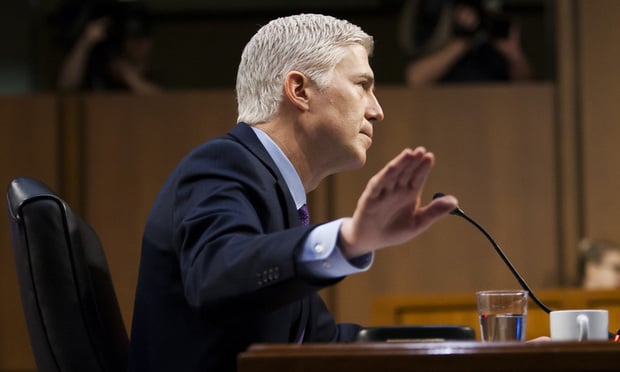Roberts Sharply Counters Criticism of His Vote Striking Down Louisiana Abortion Law
Among progressives, there was a sense that Chief Justice John Roberts Jr., although providing the key vote to strike down a restrictive state abortion clinic law, had left open a broader challenge to reproductive rights.
June 29, 2020 at 03:31 PM
7 minute read
The original version of this story was published on National Law Journal
 Protesters for and against abortion rallied March 2 outside the U.S. Supreme Court as the justices heard argument in "Whole Woman's Health v. Hellerstedt." Credit: Diego M. Radzinschi / NLJ
Protesters for and against abortion rallied March 2 outside the U.S. Supreme Court as the justices heard argument in "Whole Woman's Health v. Hellerstedt." Credit: Diego M. Radzinschi / NLJ
With his vote Monday striking down Louisiana's abortion law, Chief Justice John Roberts Jr., for the third time in two weeks, joined his liberal colleagues on the U.S. Supreme Court in rulings that dismayed or angered his colleagues on the right.
Justice Neil Gorsuch "certainly is wrong" and "Justice [Samuel] Alito misunderstands," Roberts wrote in various footnotes defending his opinion concurring in the court's 5-4 judgment in the Louisiana case June Medical Services v. Russo.
Roberts on June 18 led the 5-4 majority that ruled the Trump administration had violated federal law when it attempted to wind down the delayed deportation program for so-called Dreamers. His opinion was joined by Justices Ruth Bader Ginsburg, Stephen Breyer, Sonia Sotomayor and Elena Kagan. And on June 15, he joined those four justices and his conservative colleague Neil Gorsuch in the 6-3 ruling that Title VII's ban on discrimination "because of sex" covered discrimination based on sexual orientation and gender identity.
Abortion decisions tend to bring out a higher degree of heated dissents not often reflected in the justices' disagreements with each other. The recent rulings have renewed criticism of Roberts from social conservatives, and even the Trump White House, which on Monday declared "unelected justices"—without naming them—had intruded on the power of states to set their own rules for abortion rights.
Among progressives, there was a sense that Roberts, although providing the key vote to strike down a restrictive state abortion clinic law, had left open a broader challenge to reproductive rights.
"We are concerned about his opinion," said Julie Rikelman of the Center for Reproductive Rights, who argued the Louisiana case on behalf of June Medical. "He didn't join the Breyer [plurality] opinion."
The chief justice's opinion in the Louisiana abortion case was based primarily on stare decisis. He viewed the Louisiana case as nearly identical to the court's decision in 2016 striking down a hospital admitting privileges law in the Texas case Whole Woman's Health v. Hellerstedt. Roberts dissented from that Texas decision. In that case, a 5-3 majority ruled that the Texas law had no medical benefits and imposed an undue burden of a woman's right to access abortion.
The stare decisis doctrine requires judges, Roberts said, "to treat like cases alike. The Louisiana law imposes a burden on access to abortion just as severe as that imposed by the Texas law, for the same reasons. Therefore Louisiana's law cannot stand under our precedents."
He said at another point in his concurrence that he continued to believe that the Whole Woman's Health ruling was wrongly decided. "The question today however is not whether Whole Woman's Health was right or wrong, but whether to adhere to it in deciding the present case," he wrote.
In the Louisiana ruling, dissenting Justices Gorsuch and Samuel Alito Jr. argued that the majority in Whole Woman's Health balanced benefits and burdens to reach its decision in conflict with the test announced by the court in Planned Parenthood v. Casey in 1992. They trained their sights on Roberts' statement in his concurring opinion: "Whole Woman's Health held that Texas's admitting privileges requirement placed 'a substantial obstacle in the path of women seeking a previability abortion,' independent of its discussion of benefits."
"Justice Gorsuch considers this is a 'nonexistent ruling' nowhere to be found in Whole Woman's Health. I disagree," Roberts wrote in a footnote. He said the discussion of benefits in that case was not necessary to its holding because after the discussion, the majority "transitioned" to examining the law's burdens.
 Judge Neil Gorsuch testifies before the Senate Judiciary Committee on March 21, 2017. Credit: Diego M. Radzinschi / NLJ
Judge Neil Gorsuch testifies before the Senate Judiciary Committee on March 21, 2017. Credit: Diego M. Radzinschi / NLJGorsuch "certainly is wrong," Roberts wrote, to suggest that his position on the standard for reviewing abortion regulations is inconsistent with the court's abortion decision in Planned Parenthood v. Casey which disavowed "strict scrutiny."
Roberts noted that neither party in the Louisiana case had urged the court to "reassess the constitutional validity" of the Casey decision.
Alito "misunderstands my discussion of credentials as focusing on the law's lack of benefits," Roberts wrote in another footnote. "But my analysis, like Casey, is limited to the law's effect on the availability of abortion."
Roberts' insistence that a balancing of benefits and burdens of an abortion restriction had no role in evaluating its constitutionality "muddies the water a bit and will lead to more litigation, not less," said Rikelman of the Center for Reproductive Rights.
Despite their fundamental disagreements on key points, Roberts did find points of agreement with Gorsuch and Alito.
"I agree with Justice Aito that the validity of admitting privileges laws 'depend[s] on numerous factors that may differ from state to state,'" Roberts wrote. "And I agree with Justice Gorsuch that '[w]hen it comes to the factual record, litigants normally start the case on a clean slate.' Appreciating that others may in good faith disagree, however, I cannot view the record here as in any pertinent respect sufficiently different from that in Whole Woman's Health to warrant a different outcome."
Since becoming chief justice in 2005, Roberts has joined his four liberal colleagues in 5-4 decisions in only a handful of cases. After the retirement in 2018 of Justice Anthony Kennedy— the court's "swing" vote—Roberts was considered the justice most likely to be the median of the court, conservative but not as conservative as his colleagues to the right.
Last year, Roberts joined his liberal colleagues in blocking the Louisiana abortion clinic law from taking effect while the appeal was pending.
"The abortion right is not safe," Cornell Law School professor Michael Dorf wrote at the time. "But it's not in quite as much immediate danger as one might have thought. And that's not nothing."
Roberts' vote in the Louisiana case, with its reliance on following precedent, is not a signal of how he would vote in a direct attack on Roe v. Wade, or even the more recent Casey decision. But in combination with his votes in the Title VII and Dreamers cases, it may well signal to those colleagues to his right that now more than ever, they cannot take his vote for granted.
Read more:
Trump's DOJ Supports Overturning Key 2016 Abortion Rights Case at Supreme Court
39 Senate Republicans Ask SCOTUS to Reconsider 'Roe' Abortion Rights Ruling
'Compelled to Come Forward': Female Lawyers Urge Court to Back Abortion Rights
The Justices Had 5 Votes to Overturn 'Roe' in 1992. Why That Didn't Happen.
New O'Connor Book Chronicles Her Dementia Onset, Frustration With Alito
This content has been archived. It is available through our partners, LexisNexis® and Bloomberg Law.
To view this content, please continue to their sites.
Not a Lexis Subscriber?
Subscribe Now
Not a Bloomberg Law Subscriber?
Subscribe Now
NOT FOR REPRINT
© 2025 ALM Global, LLC, All Rights Reserved. Request academic re-use from www.copyright.com. All other uses, submit a request to [email protected]. For more information visit Asset & Logo Licensing.
You Might Like
View All
Former Director's Retaliation Suit Cleared to Move Forward Against Hospice Provider
3 minute read
EMT Qualifies as 'Health Care Provider' Under Whistleblower Act, State Appellate Court Rules
4 minute read
Pa. Defense Firm Sued by Client Over Ex-Eagles Player's $43.5M Med Mal Win
3 minute readTrending Stories
- 1Public Notices/Calendars
- 2Wednesday Newspaper
- 3Decision of the Day: Qui Tam Relators Do Not Plausibly Claim Firm Avoided Tax Obligations Through Visa Applications, Circuit Finds
- 4Judicial Ethics Opinion 24-116
- 5Big Law Firms Sheppard Mullin, Morgan Lewis and Baker Botts Add Partners in Houston
Who Got The Work
J. Brugh Lower of Gibbons has entered an appearance for industrial equipment supplier Devco Corporation in a pending trademark infringement lawsuit. The suit, accusing the defendant of selling knock-off Graco products, was filed Dec. 18 in New Jersey District Court by Rivkin Radler on behalf of Graco Inc. and Graco Minnesota. The case, assigned to U.S. District Judge Zahid N. Quraishi, is 3:24-cv-11294, Graco Inc. et al v. Devco Corporation.
Who Got The Work
Rebecca Maller-Stein and Kent A. Yalowitz of Arnold & Porter Kaye Scholer have entered their appearances for Hanaco Venture Capital and its executives, Lior Prosor and David Frankel, in a pending securities lawsuit. The action, filed on Dec. 24 in New York Southern District Court by Zell, Aron & Co. on behalf of Goldeneye Advisors, accuses the defendants of negligently and fraudulently managing the plaintiff's $1 million investment. The case, assigned to U.S. District Judge Vernon S. Broderick, is 1:24-cv-09918, Goldeneye Advisors, LLC v. Hanaco Venture Capital, Ltd. et al.
Who Got The Work
Attorneys from A&O Shearman has stepped in as defense counsel for Toronto-Dominion Bank and other defendants in a pending securities class action. The suit, filed Dec. 11 in New York Southern District Court by Bleichmar Fonti & Auld, accuses the defendants of concealing the bank's 'pervasive' deficiencies in regards to its compliance with the Bank Secrecy Act and the quality of its anti-money laundering controls. The case, assigned to U.S. District Judge Arun Subramanian, is 1:24-cv-09445, Gonzalez v. The Toronto-Dominion Bank et al.
Who Got The Work
Crown Castle International, a Pennsylvania company providing shared communications infrastructure, has turned to Luke D. Wolf of Gordon Rees Scully Mansukhani to fend off a pending breach-of-contract lawsuit. The court action, filed Nov. 25 in Michigan Eastern District Court by Hooper Hathaway PC on behalf of The Town Residences LLC, accuses Crown Castle of failing to transfer approximately $30,000 in utility payments from T-Mobile in breach of a roof-top lease and assignment agreement. The case, assigned to U.S. District Judge Susan K. Declercq, is 2:24-cv-13131, The Town Residences LLC v. T-Mobile US, Inc. et al.
Who Got The Work
Wilfred P. Coronato and Daniel M. Schwartz of McCarter & English have stepped in as defense counsel to Electrolux Home Products Inc. in a pending product liability lawsuit. The court action, filed Nov. 26 in New York Eastern District Court by Poulos Lopiccolo PC and Nagel Rice LLP on behalf of David Stern, alleges that the defendant's refrigerators’ drawers and shelving repeatedly break and fall apart within months after purchase. The case, assigned to U.S. District Judge Joan M. Azrack, is 2:24-cv-08204, Stern v. Electrolux Home Products, Inc.
Featured Firms
Law Offices of Gary Martin Hays & Associates, P.C.
(470) 294-1674
Law Offices of Mark E. Salomone
(857) 444-6468
Smith & Hassler
(713) 739-1250









